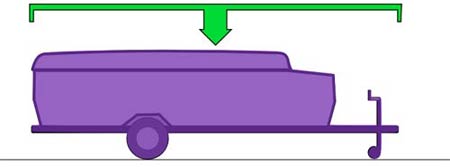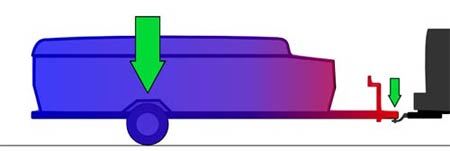Brief Weight Explanation
Dry Weight
This is the total weight of the camper without fluids (water, propane, toilet deodorizer) or a battery. Flagstaff's brochure calls this the Unloaded Vehicle Weight.

Hitch Weight
This is the portion of the total weight of the camper carried by the hitch. Flagstaff's brochure calls this the Base Dry Hitch Weight. It's also called the tongue weight because the frame piece the coupler attaches to is called a trailer's "tongue". Hitch weight is important to know because the hitch weight must be less than the tow vehicle's hitch weight capacity (a tow vehicle's hitch capacity should be listed in the vehicle's instruction manual).
The balance of the trailer's weight pushes down on the axle (Flagstaff lists this as the Base Dry Axle Weight). Axle weight is less important to us than dry weight and hitch weight because dry weight tells us how much weight our vehicle will be pulling and hitch weight tells us how much weight our suspension needs to handle. Axle weight only tells us what size axle needs to be on the trailer--and Flagstaff's engineers figured that out when designing the trailer.

GVWR
This is the total weight a trailer can handle including the trailer itself, water, propane, battery, and all of the gear that can be loaded into the camper. Flagstaff's brochure no longer lists the GVWR because it can be a confusing term (GVWR is sometimes mistaken for dry weight. GVWR is just the theoretical maximum a trailer could weigh, not what it actually weighs; dry weight is the actual weight of the trailer). GVWR is generally based on the load rating of the tires plus the portion of the trailer's weight carried by the hitch/tow vehicle.

For further details concerning weight and weight considerations, please see Weighting Is The hardest Part.
Privacy © 2009-2025 Roberts Sales. All rights reserved.

